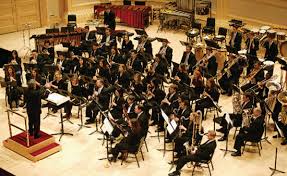ensemble
英 [ˌɒnˈsɒm.bəl]
美 [ˌɑːnˈsɑːm.bəl]
- n. 全体;总效果;全套服装;全套家具;合奏组
- adv. 同时
使用频率:

记忆方法
1、en- "intensive prefix" + sembl- "gather, together" + -e.
2、含义:all the parts of a thing considered together.
3、as an adverb, "together, at the same time"; 受到 simul / simul- "at the same time" 的影响,然后变体而得,类似于:dissimulate => dissemble.
2、含义:all the parts of a thing considered together.
3、as an adverb, "together, at the same time"; 受到 simul / simul- "at the same time" 的影响,然后变体而得,类似于:dissimulate => dissemble.
中文词源
ensemble 剧团
en-, 进入,使。-semble, 相同,同时,词源同same, assemble. 即多乐器同时演奏。
英语词源
- ensemble
-
ensemble: see similar
- ensemble (n.)
- 1703, "union of parts, parts of a thing taken together," from French ensemblée "all the parts of a thing considered together," from Late Latin insimul "at the same time," from in- intensive prefix + simul "at the same time," related to similis (see similar). Musical sense of "union of all parts in a performance" in English first attested 1844. Of women's dress and accessories, from 1927. Earlier in English as an adverb (mid-15c.), "together, at the same time."
权威例句
- 1. Foote's most recent play, "Dividing the Estate," is an ensemble piece.
- 福特的最新戏剧《分房产》是个合演剧目。
- 2. He has also formed an exciting ensemble from his dancers.
- 他还将他的舞蹈演员们组成了一个人们非常喜欢的舞蹈团。
- 3. A black silk tie completed the ensemble.
- 再配上一条黑色丝绸领带,整套服装就齐全了.
- 4. We should consider the buildings as an ensemble.
- 我们应把那些建筑物视作一个整体.
- 5. He has mastered enough of the complexities of arrangement to write and score a piece for a chamber music ensemble.
- 他对改编的复杂之处已有了足够的掌握,能够谱写一部室内合奏曲了。
